#werewolf the apocalypse
Text

22 notes
·
View notes
Text
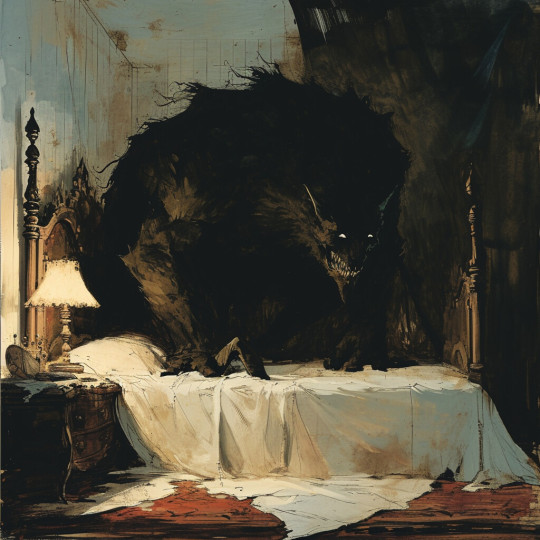
Artwork by: DreamsinFrames
3K notes
·
View notes
Text
Werewolf: the Apocalypse 5th Edition and the Anti-Indigeneity in the Gaming Industry
reosted with permission from J.F. Sambrano
Dagot’ee!
Shii J.F. Sambrano gonsēē. My nations are Chiricahua Apache (Ndeh) through my maternal grandmother and Cora Indian (Náayarite) through my maternal grandfather. I am a mixed race Indigenous person, and through my father my heritage is English and Scottish. I am currently residing and doing work in my community on the lands of Lummi Nation. I use both gender non-binary and masculine pronouns, but prefer the former. I have several published works in the TTRPG industry, and am probably most known for my contributions to Mage: the Ascension 20th Edition, Werewolf: the Apocalypse 20th Edition, and the Transformers Roleplaying Game, as well as being part of the Essence 20 development team. Further, I also work in higher education at an Indian college, both advising and teaching Indigenous students across the United States. My passion is education, and I believe that we all learn through play, and that TTRPGs are a valuable source of learning, especially on personal, cultural, and social levels. This has always been what has drawn me to TTRPGs since I started playing M.E.R.P. with my brother in 1996 (and before that HeroQuest), through to my “graduation” into more story-driven games such as those presented in the Storyteller System, until now, where I author and produce my own roleplaying games.
I was also part of the First Team (in-joke intentional) hired by White Wolf Studios/Paradox Interactive via Hunters Entertainment to develop and author Werewolf: the Apocalypse 5th Edition. After several months of work, Paradox Interactive chose to go in another direction in early 2021 (I believe it was either March or April) and in fall of that year, it was announced that Werewolf would instead be taken in house, with Justin Achilli as the Brand Creative Lead and primary author of the book. Going forward I will be describing my experience while I worked with Paradox Interactive, primarily through Karim Muammar, White Wolf’s Brand Editor, as well as the developmental editor for Werewolf. Although I worked in a team, both with hired authors and in-house representatives at Hunters Entertainment, I will not be speaking for the experience of others, except when specifically noting unanimous consensuses, and specific interactions (which will go unnamed) that are particularly relevant. My hope is that by highlighting some of the anti-Indigenous attitudes that are central to the foundational members and leaders of the White Wolf brand, that I can provide opportunities for growth and healing within the World of Darkness TTRPG community, but also in the broader gaming community, where these behaviors and attitudes are rampant. I also want the community to have a better understanding of what this experience is like internally, and the challenges that Indigenous creators, as well as other marginalized creators, are met with when they try to make positive change within nerd and geek communities clinging to inherited white supremacist values, even if they don’t realize they are doing so.
What I do not want to be doing in this article is creating fuel for edition wars. I believe that both legacy and Werewolf 5th are rife with anti-Indigenous attitudes, and appalling amounts of appropriation. Both versions deserve criticism, I am not defending one over the other, I am only sharing what my experience was like working on the 5th edition of the book. Further, please understand that I was originally going to wait until I had read the final copy of the book, because I wanted to know how much of my work was used (based on previews I already know some was, just not the extent) and whether or not they decided to credit me for that work, and how I was going to be credited. My belief is that I likely will not be, but I am genuinely uncertain. Knowing how they handled that would have reframed how I addressed this. But more importantly, I want it to be very clear that even before Paradox ultimately pulled the plug on the Hunters team, I was preparing to exit working on the project based on the experience I will describe below. Not only did I find it frustrating, and personally disparaging, but I ultimately decided I was uncomfortable with my name being attached to the product based on the direction they wanted to go. So while I wanted to know whether or not I would be credited, because it would teach me something about their internal practices, I do not want or need the credit.
Finally, the reason that I decided to speak about this now instead of after having a chance to inspect the final product, was because my personal experience dealing with anti-Indigeneity coming from Paradox was just that: personal. But since then I have witnessed a throughline of hateful and xenophobic attitudes wielded against Indigenous people across the globe, and we do not deserve this treatment. I was outraged over the events that led to the segregation of the Latin American fanbase, which culminated from bottom-up criticism about how poorly their people and countries were being defined through World of Darkness products, and ended up with the firing of their Latin American Brand Ambassador, Alessa Torres, because she chose to stand with her community in those criticisms. I was further appalled when the likeness of Tāme Wairere Iti was shoehorned into the Werewolf book, a blatant example of cultural theft: not only in stealing the literal physical identity of an Indigenous person, but also his sacred tā moko. When Paradox Interactive issued an apology for this, it felt incredibly hollow to me in the wake of these events, the hateful attitudes I had personally witnessed coming from the top.
Whether from North America, Mexico, Brazil, Argentina, or Peru, or across the globe in New Zealand, not only do Indigenous people deserve better treatment from such a major company, but their Indigenous and Latino fanbases, who have twisted and worked themselves through difficult representation for decades at this point, deserve better. Apologies are not enough, especially when they come with next to no real change.
Werewolf: the Apocalypse in Context
At the time that White Wolf Publishing began to produce its World of Darkness line, the TTRPG industry was dominated by white men, both as producers, developers, and authors, as well as the main characters in their settings. White Wolf's World of Darkness made an impact at the time, by defying these Eurocentric, patriarchal presentations, first by defaulting to feminine pronouns throughout Vampire: the Masquerade, and then by focusing on Indigenous representation and values in Werewolf: the Apocalypse, and as a young Indigenous nerd, it had a positive impact on me, as I know it has on some other Indigenous people who became fans of the World of Darkness at the time. This was because before opening the pages of Werewolf: the Apocalypse, I had never seen heroes that I could play who looked like me and my culture. It was off, and often offensive, but it was my first experience in which I could directly play a hero who shared my heritage--and I also had more than one option through two different Tribes to do so. This might sound a little like I was cheering for table scraps, but again, at the time, table scraps was more than I had ever seen before.
Werewolf: the Apocalypse 1st Edition was originally published in 1992 via then White Wolf Publishing (not to be confused with Paradox Interactive's White Wolf). From its inception, the premise was interwoven with what its then-authors believed to be Indigenous praxis and representation. Like many pop-culture presentations of Indigeneity from this time period (see Fern Gully, Dances With Wolves, Disney’s Pocahontas, or in TTRPGs, the NAN from Shadowrun) it was rife with problematic and even offensive stereotyping. The most obvious examples thereof are within the two "Pure Tribes" Uktena, and W****** who I will henceforth refer to as Older and Younger Brother. However, Indigenous inspiration was at the core of the game's spiritual premise as well, where animism and "Totems" are central to the setting and gameplay. The way these concepts are presented is trivializing and dehumanizing, but it is important to acknowledge that the appropriation present in Werewolf: the Apocalypse goes a lot deeper than the two Brother Tribes (even the term "Tribe" was meant to invoke a vision of Indigeneity compared to the previous setting in the line's use of "Clan"). Additionally, there is art throughout every generation of these gaming books that represents humans, wolves, and human-wolf hybrid forms wearing Indigenous regalia, including sacred items such as headdresses, or engaged in sacred rituals such as the Sun Dance. The list of problematic representations goes deep, and my examples only scratch the surface, but it is also important for me to note the positive impact that this had, particularly in the 90's.
Even though the primary contributors to these narratives were non-Indigenous authors, or in one case, a Pretendian, and another, a culturally disconnected author, by the time the Revised (or Third Edition) era of the books came around, White Wolf Publishing was actively engaged in cultural consultation. While I do not believe cultural consultation makes a big difference on its own, it matters that the attempt was made, to a degree: while these efforts fall short of what needs to be seen in cultural representation, this was still ahead of most other gaming companies at this time.
Hired by Hunters Entertainment
In February of 2020 I was approached by one of the co-owners of Hunters Entertainment to be one of the primary authors for Werewolf: 5th Edition due to my work on other World of Darkness projects, and let's be honest, because I was capable of bringing a much needed Indigenous perspective to a gameline that was rooted in Indigeneity and rotting with appropriation and racist stereotypes. I was overall receptive to the invitation, largely because I was very passionate about the World of Darkness setting overall, and Werewolf in particular, due to the impact that 90's representation had on me when I was a younger gamer. I also felt hopeful that with a really hard rewrite of Indigenous aspects of the game that I could shift a lot of really painful aspects of the game into something that was a net positive for Indigenous representation. I will tell you now, more than anything, I was excited to rewrite the Younger Brother Tribe, because when separated from racist authors, their message is very empowering and real to my lived experience.
That said, I did not agree to join the project without first asking for reassurances. I said that I was not willing to write negative Native stereotypes. I would not use appropriative language, or generally engage in appropriative writing (which meant at minimum that the names of the Pure Tribes would need to change), and most importantly, that I would not not engage in writing that contributed to erasure. While the person who recruited me to work on the project was eager to work with me, he acknowledged that he was not sure he could get everything I wanted to see approved, but also promised to fight for everything I suggested as hard as he could. Additionally, he shared with me that the original setting pitch for W5 involved all of Younger Brother being slaughtered en masse in a massacre. I made it clear that this was exactly the kind of thing that I would not write. I cannot remember if this was something he suggested to be changed before or after I was invited onto the project, but with some pushback it was changed. However, I point this out because I want you, the reader, to understand how eager Paradox Interactive was to start with mass genocide and erasure as a foundation to the setting. All that said, I cannot stress enough that I have had nothing but positive experiences with Hunters Entertainment, and none of the following concerns fall upon them.
The Sword of Heimdall
The first encounter the Hunters Entertainment team as a whole had with problematic guidelines for the W5 draft was the direction that Paradox Interactive wanted to go with the Sword of Heimdall. At the time, the suggestions from Paradox and Karim Muammar were that the Sword of Heimdall was going to represent the new major villain of the Werewolf setting, and that they were to also represent the far-right, fascist direction that Werewolf society so often turned toward. They were meant to be representative of how far the new concept of Hauglosk could take entire communities. However, the Sword of Heimdall was discussed interchangeably with the Get of Fenris as a whole, and more than once Muammar seemed to suggest that every member of this Tribe was guilty of the same attitudes espoused in previous editions from the Sword of Heimdall. Now let's not beat around the bush: the Sword of Heimdall are literal Nazis. They believe directly in white supremacy and don't shy from it. They wanted to cleanse impure elements from the Get of Fenris, including BIPOC people, other non-white ethnicities, women, neurodivergent Garou, and other disabled Garou.
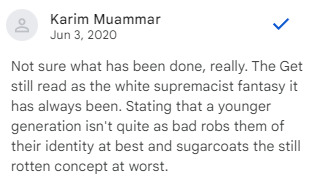
The writing team found this approach problematic for several reasons. The first, and most obvious, was that the direction seemed to want to turn one of the most popular Tribes into a horrific stereotype of its most abhorrent faction. Whether or not Muammar’s goal was to turn them into villains, we could not imagine a world where fans of previous editions would get their hands on this book, and not look for a way to play one of their previous favorite groups, thus creating the issue of making a guide to playing Nazi. Even beyond that, it’s not as if historically there were not players who used the tools of the setting to play Black Spiral Dancers, why wouldn’t this draw people who actually wanted to role-play through these toxic, harmful politics? Further, and while this is less important, it left a bad taste in my mouth, the justification for this major shift in Werewolf lore seemed to change over each pass. At first, Muammar suggested that all Fenrir were Nazis/SoH. Then, when he was provided with evidence that it was a small faction that was eliminated in the early 2000’s, he started to shift toward the idea that we should not follow the lore. Finally, when every single member of the writer’s team flatly refused to provide what would essentially be “a player’s guide to being a Nazi werewolf” the writing was on the wall about the end of our involvement with this product. More than once, he suggested that we were cowardly social justice warriors for being unwilling to work with this concept, even though there were several attempts to write a heroic version of the Fenrir that were focused on undoing these ills of the past.
Indigenous Erasure in Werewolf: 5th Edition
While the entire Hunters Entertainment writing team was handling the major, glaring issue of Paradox’s fervor to include a major Nazi element in Werewolf, I was personally dealing with the problematic approach to the Indigenous issues in the setting. The largest problem, for me, was in addressing Younger Brother’s issues, the history of non-Indigenous writers creating horrifically racist stereotypes, and what was valuable in the Tribal identity that should be saved and recentered. However, my attempts to do so were thwarted with every approach. I rewrote this Tribe four times, and offered three different versions of it to try to earn approval for a final write-up, but each time there was a lot of negativity directed towards my attempts and all them boiled down to this: Muammar felt that having two Tribes (both Younger and Older Brother) representing the “Indigenous population” was too many, and wanted them to only be focused on Older Brother, and that Younger Brother’s connection to a central, Indigenous identity, was undesirable because “other sources wrote them as having Siberian and European connections” and that future writing on this Tribe would require a lot of sensitivity…suggesting that one, Muammar wasn’t interested in doing the work to handle that level of sensitivity, and further, that he wasn’t interested in including me in future work, since I was involved with doing that at the time.

I want to take a moment to remind you that the work that was put into recovering Younger Brother started with “Let’s Kill Them Off” and at this point, through a combination of convincing and pleading, had been walked back to “They can live, but now they’re not connected to being Indigenous anymore” which is just representative genocide of a different variety. “Kill the Indian in him, and save the man.” It was also explicitly something I said I would not write about going into this project. Ultimately, my efforts did not get much further than this, with some specific exceptions I will cite below.
Karim Muammar’s Anti-Indigenous Positions
Muammar consistently and repeatedly communicated to the team in ways that were condescending and dismissive of our collective accomplishments and capabilities, but from my perspective, no one suffered as much significant derision as I did while discussing the changes I wanted to make to Younger and Older Brother in order to make their representation empowering and exciting.
In the pulled quote from the previous paragraph, I want to point out to you that Muammar, who had the title of Lead Editor on this project, refused to capitalize Native American. Further, he would often redline my work with edits to decapitalize my own uses of Native American, as well as the word Indigenous when referring to Indigenous peoples. While there are plenty of people who might want to argue about this, I will point out that both the AP style guide as well as the Chicago style guide (the one which I am most familiar with in my academic historical work) both call for Indigenous to be capitalized when referring to a people. Further, I challenge anyone to defend the consistent decapitalization of Native American. More importantly, the reason that these are standards in respected style guides, is because the English language has been used historically to oppress and erase ethnic identities, including Indigenous identities. By transforming adjectives into proper nouns, we are declaring that Indigenous and Native aren’t descriptors that can be applied to animals, plants, and soil, but real lived identities and culture groups.
When I was explaining to the Paradox team (which was mostly just Muammar) why it was important to change the names of these two Tribes from the appropriative (and offensive) ones used in the past, Muammar pushed back by defending the previously used Younger Brother name, even after reading my extensive research and explanation about how this would harm Indigenous communities and fans.
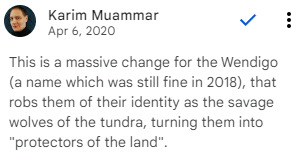
While doing so, he also decided that it was appropriate to refer to this entirely Native American tribe by the word “savages” a slur that has been specifically used to dehumanize Native Americans, and then mocked my rewrite that focused on presenting them as stewards of the land using Indigenous methodologies and praxes, instead of the “savage” racist stereotypes they were presented as in previous editions. Further, as in the above quote, even after it was communicated that the use of this term was problematic, he kept doubling-down to use it to refer to the Tribe.
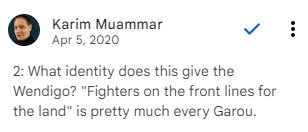
Even though I worked hard to redefine Younger Brother through Indigenous theory, such as place-based theory, relational theory, and communal theory, Muammar either refused to recognize this work, dismissing it as simple, or else simply could not understand the importance of these changes. Either way, the choice is that he didn’t want them to change, or couldn’t comprehend why the change was important because of how entrenched in white supremacist thinking he is. Further, after the massive effort that I put forward to attempt to educate him and the rest of the Paradox team on these issues, the insistence on using offensive terms and belittling my work felt intentional. So let’s talk about the work I did that was above and beyond my job description: free cultural consulting work.
“Sensitivity” and Consultation
I have seen several misunderstandings of my role working on this project going around, so I want to make something very clear. I was hired to work on this project as an author, and nothing else. I was not ever hired to be a cultural consultant. I do not do cultural consulting work. While I feel that there are many creators and companies who hire cultural consultants with the best intentions in mind, their responses often fall short of what is needed, as no one is ever obligated to actually follow the advice of cultural consultants. Further, I think there are also many companies who choose to hire cultural consultants only to say “we did this minimal step, and that is enough” in order to ward off naysayers.
However, anyone who hires me gets some level of cultural consulting for free, because it comes out in my writing–in both what I won’t write and what I choose to center my writing around. In the case of Werewolf 5th Edition, however, it was far more involved than this. I came with a plethora of “I will not write X” because I knew the setting was so problematic. A short list of my demands besides not being willing to write Indigenous erasure, was that we needed to change the names of the Pure Tribes (and the term Pure Tribe itself), we needed to change the word Totem to Patron, and also the Patrons of the Pure Tribes. We needed to move away from the term Metis for obvious reasons, and we needed to move away from the term Skin Dancers. I also specifically noted that there was a lot of cultural theft happening from the beginning of Werewolf until now that I wanted to address. The only way these issues were going to be addressed was to convince Paradox they were actual issues on the level of PR concerns, because nothing else was likely going to be considered. So in order to achieve this, I put in weeks worth of research, writing, and meetings with top level administrators with Hunters Entertainment so that they could bring this information to Paradox. I never documented my hours, but I would guess that I did approximately 80-100 hours of what I could only describe as cultural consultation work for free that was outside the contract work I was hired for. Let’s be clear: I did this willingly because I was passionate about the positive changes I wanted to see in this product, because I believed that Werewolf’s historic ills could be turned toward non-toxic representation.
Besides my actual words, such as naming the Ghost Council, and arguably the name Gale Stalkers came from a combination of names I pitched to Paradox after Winter’s Teeth was denied, and several sentences and paragraphs that I have seen so far that appear so close to what I originally wrote that you could imagine they were just edited versions, my largest contribution toward the final version of Werewolf: 5th Edition was this work. The only reason the offensive, appropriated names were changed were because of hours of my work to convince them it needed to happen. The reason that the Gale Stalkers aren’t just dead and gone: again, I pushed against this. The reason that Skin Dancers, Totem, and Metis will not appear as canonical titles? I pushed against their unwillingness to alter these things (see Karim’s defense of Wen**** Tribe name above).
Further, and this is the biggest reason I decided to write this article before seeing the final version of the book, I want to mention that I was also included in discussions with Hunters Entertainment to potentially be part of the art direction team, especially to oversee depictions of Indigenous characters, regalia, and art, to ensure that it would be represented either respectfully or not at all. I decided I needed to speak as soon as possible after the artistic portrayal of Tāme Iti appeared in the Glass Walkers preview without his permission. There are many arguments surrounding this issue and I am not going to address everything, but ultimately, I can tell you that had I remained as part of the art direction team, and saw that, I would have questioned it immediately. Even if I didn’t recognize Tāme Iti immediately, I would have asked what the source was on the depiction of moko in that piece, because I am aware that this is a sacred form of art–and I had already discussed wanting to make sure things like Crinos in headdresses didn’t appear in the book (as had often happened in previous editions, particularly on a certain white-skinned character whose name rhymes with Steals-the-Past).
As time working on this project went on, and I went through rounds and rounds of trying to convince Muammar and Paradox that it was important to not steal Indigenous identities, art, and stories, and that a greater effort needed to be put in powerful and empowering Indigenous representation, and I constantly ran into refusals and criticisms that were clearly hateful toward Indigenous identities and peoples, not to mention the push to represent Nazism as a major part of the game setting, I grew increasingly frustrated and restless with feeling like I was trying to work on a challenging project while also defending my right to exist as the person I am at every turn. Eventually I turned to another Indigenous TTRPG and game creator to ask for advice, and after a long and difficult discussion, I came to the conclusion that I was going to talk to the Hunters administration team and tell them that if Muammar kept using slurs and other anti-Indigenous language and attitudes, I was going to need to step off of this project, because it was harmful to me on a personal level. In furtherance of this point, I have been avoiding doing any contract work at all where I can tell that I am wanted for my specific cultural perspective ever since, because this situation was so harrowing for me.
Unfortunately, before I could have this conversation, after one final draft of Younger Brother and Bone Gnawers (which had its own issues, but that is not the point of this discussion), before we received any other specific feedback, the Hunters Entertainment administrators announced to the writing team that Paradox had decided to take the book in-house, and would no longer need our services.
The main point I would like to leave you with, besides these few specific quotes (out of dozens and dozens) that Muammar made that were anti-Indigenous, is that there is often a big call to have more BIPOC voices in various entertainment industries, so that both our stories, perspectives, and unique views on how the universe and life works, can be included; so that an industry that is historically, harmfully Eurocentric, might turn toward new, healthier, and inclusive directions. And I agree with this call for change, but I implore you to consider the conditions that BIPOC creators often have to work under: doing cultural/identity work and consultation for free as part of being present, being subject to vicious refusals of our experiences and perspectives, and straight-up having slurs lodged against our work. I want to see these changes in the industries we love, including the gaming industry, but currently the people who are in charge, who have the most power, are severely hostile to our work and our perspectives. This is why, for example, works like Coyote & Crow were done with an almost entirely Indigenous group of creators, and led by Indigenous creators, because trying to work for and with this ugly, hateful, and xenophobic group of people is so often exhausting, both mentally and spiritually, and because no good changes end up being made.
I am glad the harmful, appropriative terms were removed from the setting. I am glad I was part of the fight to make that real. I am not so glad that I was treated with hostility and racism by Muammar for the effort and love I put into this work, and I am not so glad that I will certainly be reviled by one of the two communities I did this work for–the gaming community, and certainly the people in power in this industry–and I am also not so glad that I didn’t have the opportunity to properly acknowledge how much of Werewolf’s base themes and setting are twisted and tied-up in Indigenous appropriation without giving the proper acknowledgments.
More than anything, I hope that this story will help you, the fans, realize that there is a lot of darkness in these communities, and they won’t change unless you hold their feet to the fire.
Ánaagodzįįhł
J.F. Sambrano
#decolonization#ttrpg#werewolves#writing#world of darkness#werewolf: the apocalypse#werewolf the apocalypse#mage: the ascension#vampire: the masquerade#changeling: the dreaming
2K notes
·
View notes
Text
Werewolf influencers.
They want you to lycan subscribe
1K notes
·
View notes
Text
Vampires are horny like queer fuckboys on Grindr. Werewolves are horny like anarchists in a squat. Changelings are horny like starving artists in a drug-drenched commune. Mages are horny like overworked university students. Hunters are horny like soldiers crowded in a trench. Demons are horny like repressed feudal courtiers. The Hungry Dead are horny like creepy cult members. Wraiths are horny like a depressed motherfucker who just wants to feel anything again. Mummies are utterly and completely devoid of horny, as unhorny as a job application, they are antihorny. This is why nobody ever plays Mummy: The Resurrection.
#world of darkness#vampire the masquerade#werewolf the apocalypse#changeling the dreaming#mage the ascension#hunter the reckoning#demon the fallen#wraith the oblivion#mummy the resurrection
1K notes
·
View notes
Text
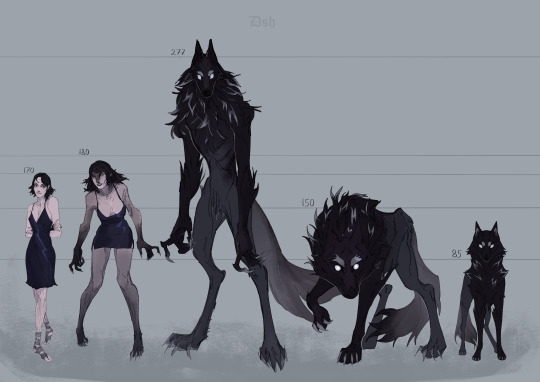
This reference is almost a year old, but I still like it, as well as the character herself
Glare-on-the-Water, lupus ragabash Shadowlord
#wod#world of darkness#oc#werewolf the apocalypse#wta#ragabash#shadow lord#shadowlord#lupus#reference#garou#homid#glabro#crinos#hispo
277 notes
·
View notes
Text
Thinking about how vampirism in the World of Darkness isn’t just dehumanizing in the sense that it makes you a literal monster but also how the Embrace quite directly rips away some of the most meaningful parts of someone’s identity to make room for the Beast.
Like, the obvious examples here are Garou and mages, given that the former, when Embraced, become the aptly-named Abominations, who lose their connection to Gaia and the Umbra and find themselves forcibly aligned with the Wyrm, the force that they view as the most horrific and destructive thing in the world; and the latter have their Avatar, their connection to magic and possibility and understanding, utterly annihilated— their one guiding light extinguished and replace with an entity that is (except for probably in the case of widderslainte) more vicious and cruel than even the most harrowing Avatar.
It’s telling that the Embrace is thus reflective of something each group considers to be one of the worst fates imaginable: dancing the Black Spiral and undergoing Gilgul, respectively.
But that’s a lot of jargon and doesn’t really hit if you don’t know the details of those game lines— the haunting part is that the basic idea remains the same even for mortals.
I mean, it’s true that everyone, mortal or otherwise, has some degree of intrusive urges toward malicious behavior, but the Beast is just so much worse than that. To be Embraced is to straightforwardly die, to lose the essence that keeps you alive, and have it brought back in this twisted form— from now on, to live is to kill and the Beast will never let you forget it.
Sure, vampires still retain their old interests and passions. I’m personally not keen on the interpretation of Kindred as inherently not having things like empathy, creativity, or grief. I think they still feel compassion and curiosity and tranquility and love and all that… but always, lurking behind them, is the Beast.
And maybe I’m just being a self-serious edge-boi but that’s such an unnerving thought. To still care about the people around you, but never without something whispering about how much you need— deserve— their loyalty, their service, their deaths.
#wod#world of darkness#mage the ascension#werewolf the apocalypse#vampire the masquerade#vtm#cw existential horror#I guess existential horror anyway#I don’t know what else you call it#a really bad time
490 notes
·
View notes
Text

My ahroun and a full moon.
#uzloart#Jasper#Jasper Jones#garou#Werewolf the apocalypse#W:tA#Dies#vampiri#glass walker#lupus#ahroun#giant mega moon attack
442 notes
·
View notes
Text
Old gifs from the white wolf website taken from the wayback machine in 1996





I could put the other assets in too but I find this the most charming tbh dfghj
#wod#world of darkness#vtm#ctd#wta#mta#wto#vampire the masquerade#changeling the dreaming#werewolf the apocalypse#mage the ascension#wraith the oblivion#old web
617 notes
·
View notes
Text
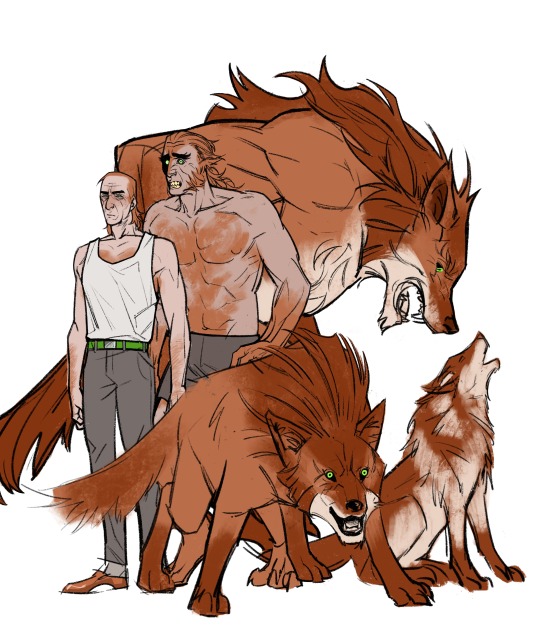
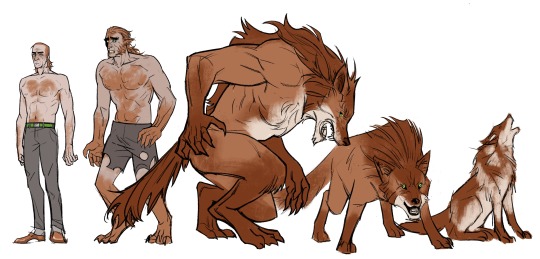
He is actually one of my historical ocs (Why haven’t I post nothing about him here) and I decided to au/wolfiefy him.
186 notes
·
View notes
Text
I keep seeing polls made for people unfamiliar with a piece of media to ask them to try and identify the thing that does not happen in said media, and I always thought those looked like a lot of fun! So, I decided to make one, and I already knew the perfect franchise for one: The World of Darkness (WoD) TTRPG franchise. The WoD is a franchise containing several different TTRPG’s about playing as monsters, and it has some of the most unhinged lore I have ever come across.
Almost everything above is heavily simplified for the sake of fitting into the poll boxes btw. Also, I promise that this is not a trick. Ten of the Eleven options presented above actually are a part of this franchises seemingly infinite Metaplot. I’ll schedule a reblog containing the answer and some much needed context for everything above.
#tumblr polls#polls#World of Darkness#vampire the masquerade#werewolf the apocalypse#mage the ascension#changeling the dreaming#demon the fallen#wraith the oblivion#a certified themainspoon classic
394 notes
·
View notes
Text
a way for the skaven running gag to continue via the Ratkin
Kitten: Okay this has been bothering me for a while. If there's things like werewolves and werecats-
Big D: Hold on, I told you about werewolves. How do you know about werecats?
Kitten: Long story, lots of family drama, I'd prefer not to get into it right now. But my point is are there other shapeshifters?
Big D: You BET THERE ARE. No werechihuahuas, though. That's a joke. And it's NOT FUCKING FUNNY, DEAR GOD I AM SO FED UP WITH THE TOMES OF ARCANE LORE FILLED UP WITH JOKE POSTS ABOUT THEM and okay, okay. Off track. Anyway, there are indeed many different types of shapeshifters.
Boy, wandering from another room: There's wererats and stuff
Big D: Quite so! They're hardly friendly to humans, for you see, they're quite fed up with human corruption being responsible for HEY WHOA WAIT WAIT. Boy! How do YOU know about wererats!?
Boy: They talks to me all the time.
Kitten: They do?
Boy: Dunno why. They just wander up and complain about humans being a pestilence upon the world. One of them wants to show me a giant mouse wheel it wants to make into a big bike thingy, though.
#hunter the parenting#WoD#world of darkness#ratkin#werewolf the apocalypse#given how the Ratkin are completely bonkers but in a somewhat morally gray way#and functionally fighting for the survival of the world#vs the skaven being comically evil even by Imperium standards#they also nicely have the 'TTS but everything just slightly askew' vibe that#HtP seems to be taking to character adjustments#queued
218 notes
·
View notes
Text
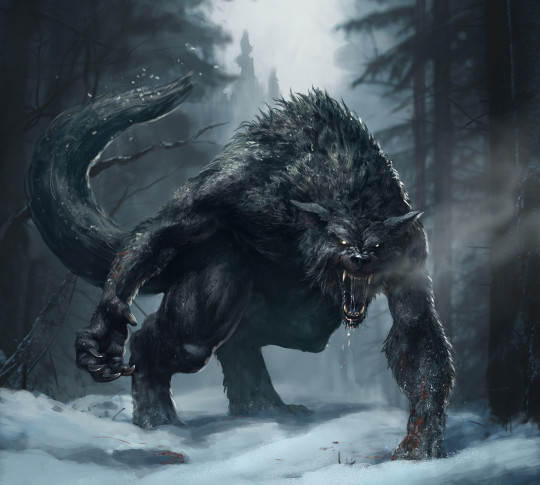
Artwork by: Tomasz Ryger
210 notes
·
View notes
Text
Likes don’t increase visibility to others! Please reblog this to spread the word!
I think Werewolf is an inherently queer medium
This is all a part of a larger long-term project.
I am trying to hold the World of Darkness to higher standards of inclusivity.

Book 1: Cliath
Meet The Gaians — a chosen people blessed by Gaia of whom among them there are heroes who are born, blessed with the power to Change. They have been charged with the duty of protecting her and her brood, and among them are fellowships from every culture. They are largely comprised of Kinfolk. Vanguards of the earth, they follow the Codes and Creeds of renown in chiminage to the spirits in exchange for favor, protection, and power to strengthen their Fellowships and they form one of several primary factions.
A small number of Gaia’s chosen have been gifted the ability to shapeshift through either bite or birth into animals; warriors joining the fight against the Wyrm. The Gaians have many secret names for these shapeshifters between their cultures, and they range across many animal species and tribes, but the most common among them in these times are Garou.
This sourcebook includes information on First Changes, Rites of Passage, how people become werewolves, and what they're fighting for. Book 1 is effectively a players guide, including enough comprehensive character creation rules for people to create rank 1 Garou.
The World of Darkness is implied to exist just beneath a facade that all others take for granted as simply being a world gone wrong. When the Change happens to a Garou, human or otherwise, the world they once knew ceases to be. The Apocalypse is said to be something happening to everything, everywhere, simultaneously, and on every level. This transcends the concept of everything succumbing to a singular event but many small ones.
In many ways, the Garou themselves are emblematic of this Apocalypse, with these former lives ending and sweeping the cub into something far bigger than themselves. A Call To Action is the theme of Book 1.
Book 1: Cliath goes into warborn, bitten, wolf-born, and human-born lives leading up to the change. It presents a curated depiction of the Garou from the perspective of those who would mentor them. There are not a lot of conflicts, profound lore, or politics so much as 'this is what we are, this is what we do.' Functionally, this can be considered a Players’ Guide, containing your attributes, abilities, advantages, and Merits and Flaws. Gifts and rites will be truncated to rank 1 for the most part. Guidelines for new STs will be found here, including enough powers and enemy stats to keep their troupe of players on their toes. This will also include things like chargen and descriptions of attributes, abilities, and advantages. This will also have many details on packs and the importance of one's packmates. And what better way to introduce new players than to have it happen in an all-new setting for storytellers to introduce their players to the game: the first three chapters of Dead Mountain!
Dead Mountain isn't going anywhere. In fact, it will be used as the foundation for this series. Already-finished parts of the Dead Mountain will be released over the next few months, and a delayed release of the full chronicle will come next spring. The scope of Werewolf: the Essentials will strongly diverge from past game traditions. In past core books and settings, there was an intent to showcase the world at large, written from the perspective of people who had never been to these places. In the end, many details were laughably wrong or mediocre representations that didn’t appeal to the groups they represented. We want the World of Darkness to be HUGE. So, we will be laser-focusing this project to represent the Garou from the Pacific Northwest as an example, with guidelines on how to make your own World of Darkness at your locale HUGE too!
CALLING ALL CHARACHS!
We cannot make this happen without your help.
We are putting out the call for folx from all parts of the queer, lesbian, trans, bisexual, gay, and asexual werewolf fandom looking to help make this the best possible release we can:
Artists
Horror writers
Editors
Consultants
Hype Wolves to help spread the word
Indie TTRPG creators
Working together, we can create a game that is fun, engaging, and genuinely representative of the diverse community of players and fans who love Werewolf.
To help us out, click here
We look forward to providing you future updates!
UPDATE: Our team has grown huge, and we're grateful to the fandom for rising up and howling with us! We received far more applications than we were able to fully process, but we promise to deliver you the best possible Sourcebook anthology we can!
Meet the Writing Team
Meet the Art Team
Follow our official account for future announcements!
To check out a book preview and help us hire cultural consultants click here
Social Media Shout-out! I offer my thanks to @peltofash and @a-boros-named-seamus for supporting me on the Adren and Athro tiers! Your contributions are directly helping make this game more inclusive!
#world of darkness#werewolf: the apocalypse#dead mountain#werewolf the apocalypse#werewolves#world building#queer werewolf#lesbian werewolf#werewolf the essentials#wta#w5#werewolftheapocalypse#werewolf wednesday
360 notes
·
View notes
Text
Pointedly insist vampires are a werewolf tribe.
They can turn into wolves, ok? They're werewolves!
335 notes
·
View notes
Text

Created by myself
#world of darkness#vampire the masquerade#mage the ascension#chronicles of darkness#werewolf the apocalypse#wod#ttrpg
305 notes
·
View notes